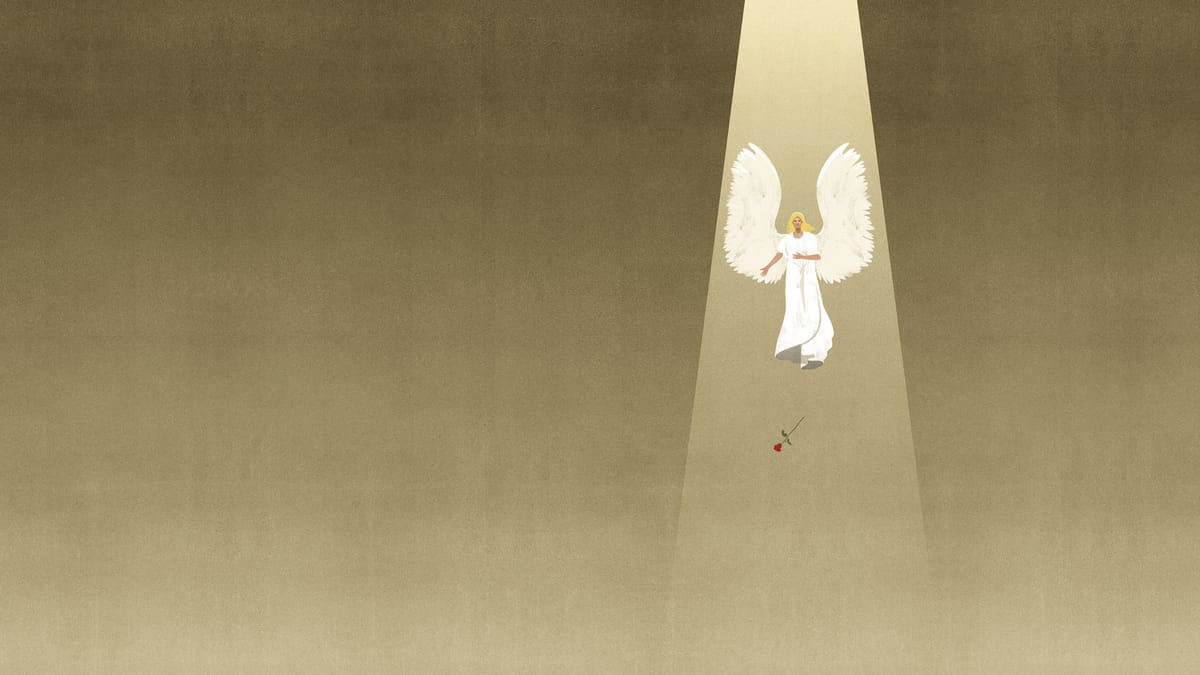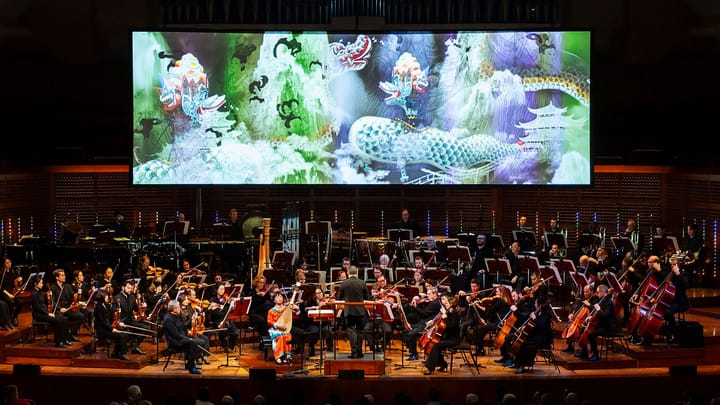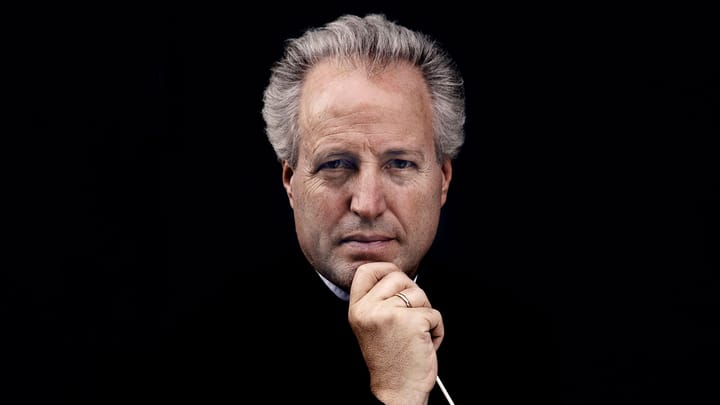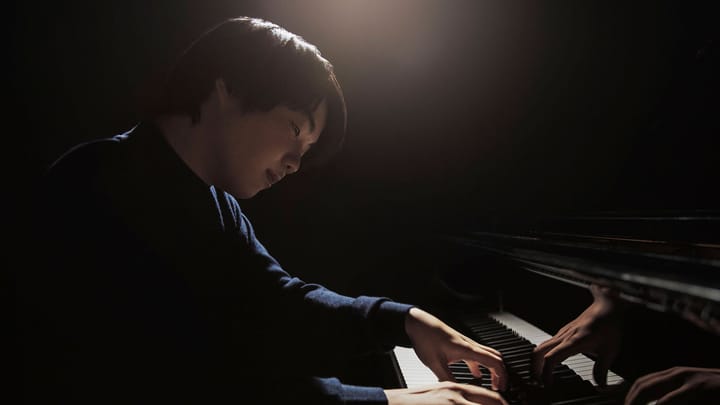In This Program
- The Concert
- At a Glance
- Program Notes
- Text and Translations
- About the Artists
- About San Francisco Symphony
The Concert
Friday, June 20, 2025, at 7:30pm
Sunday, June 22, 2025, at 2:00pm
James Gaffigan conducting
Wolfgang Amadeus Mozart
Ave verum corpus, K.618 (1791)
Gordon Getty
Intermezzo from Goodbye, Mr. Chips (2017)
Concert Premiere
Saint Christopher (2024)
World Premiere
The Old Man in the Snow (2020)
First San Francisco Symphony Performances
San Francisco Symphony Chorus
Jenny Wong director
Intermission
Giuseppe Verdi
Messa da Requiem (1874)
Requiem
Dies irae
Offertorio
Sanctus
Agnus Dei
Lux aeterna
Libera me
Rachel Willis-Sørensen soprano
Jamie Barton mezzo-soprano
Mario Chang tenor
Morris Robinson bass
San Francisco Symphony Chorus
Jenny Wong director
Lead support for the San Francisco Symphony Chorus this season is provided through a visionary gift from an anonymous donor.
The June 20 concert is generously sponsored by Moira Conzelman in memory of her husband, Bruce Conzelman.
Program Notes
At a Glance
On the first half, after Mozart’s choral jewel Ave verum corpus, are three recent choral works by San Francisco composer Gordon Getty, including premieres of the Intermezzo from Goodbye, Mr. Chips and Saint Christopher.
Ave verum corpus, K.618
Wolfgang Amadeus Mozart
Born: January 27, 1756, in Salzburg
Died: December 5, 1791, in Vienna
Work Composed: 1791
SF Symphony Performances: First—April 1965. Josef Krips conducted with the Stanford University Chorus. Most recent—April 2013. Bernard Labadie conducted with the San Francisco Symphony Chorus.
Instrumentation: chorus, organ, and strings
Duration: About 3 minutes
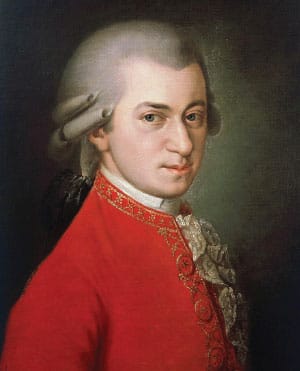
The Ave verum corpus is Mozart’s most exquisitely simple and briefest music to a sacred text. Together with his last piano concerto, completed in January 1791, and parts of The Magic Flute, it raises the forever unanswerable question whether Mozart in his last years might have been searching for a new simplicity of style after the gorgeous complexities of the 1780s. We have no more exquisite example of much-in-little than this flawlessly cut jewel. The harmonies are plain, the texture hardly less so, yet in his whole life—chronologically so short, artistically so long—Mozart never invented anything more affecting than those 46 perfect measures.
He wrote the Ave verum corpus on June 16 and 17, 1791, while visiting his wife and their son Karl at Baden, a spa near Vienna. The work was a gift for Anton Stoll, organist and choirmaster of the Baden parish church. Stoll likely led the first performance, probably on June 23, 1791, the Feast of Corpus Christi.
—Michael Steinberg
Selected Choral Works
Gordon Getty
Born: December 20, 1933, in Los Angeles
Works Composed: 2017–23
First SF Symphony Performances
Instrumentation: Intermezzo from Goodbye, Mr. Chips—chorus, flute, oboe (doubling English horn), 2 clarinets, contrabassoon, 2 horns, trumpet, 2 trombones, marimba, vibraphone, harp, piano (doubling celesta), and strings
Saint Christopher—chorus, 2 flutes, 2 oboes, 2 bassoons, contrabassoon, 2 horns, 2 trumpets, trombone, timpani, tubular bells, harpsichord, Baroque organ, and strings
The Old Man in the Snow—chorus, 3 flutes, 2 oboes, English horn, 2 clarinets, bass clarinet, 2 bassoons, contrabassoon, 4 horns, 3 trumpets, 3 trombones, tuba, timpani, percussion (glockenspiel, vibraphone, tubular bells, xylophone, and marimba), harp, piano (doubling celesta), and strings
Total duration: About 20 minutes
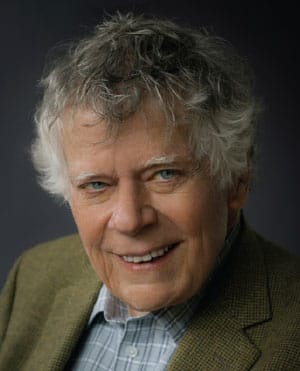
With the November 2021 premiere of his operatic film Goodbye, Mr. Chips, San Francisco composer Gordon Getty added a fourth opera to his catalog, which also includes works for orchestra, chorus, vocal and instrumental soloists, and chamber ensembles. His staged works have been mounted by Leipzig Opera, Welsh National Opera, San Francisco Opera, Los Angeles Opera, and Bolshoi Ballet, while his orchestral repertoire has been recorded and performed by the San Francisco Symphony with Michael Tilson Thomas, the Russian National Orchestra with Mikhail Pletnev, and the Academy of St Martin in the Fields with Neville Marriner. Getty’s life in music is the subject of Peter Rosen’s 2016 documentary There Will Be Music. Recent honors include the European Culture Prize and an inaugural induction into Opera America’s Hall of Fame. Getty is a Pentatone artist and his music is published by Rork Music.
The Music
The Intermezzo from Goodbye, Mr. Chips comes from his latest opera, based on James Hilton's popular 1934 novella of the same name, as well as other stories by the author. Goodbye, Mr. Chips tells the heart-warming story of a teacher at Brookfield, an all-boys English boarding school to which “Chips” dedicates most of his adult life. The opera chronicles Chips’s story of love, loss, and learning over his decades-long tenure at Brookfield. The Intermezzo serves as an entr’acte before the second act, featuring the reprise of a chorus of boarding school boys singing their school song. Both Saint Christopher and The Old Man in the Snow are set to poems by Getty. He described:
I wrote the poem “Saint Christopher” in college days. The first four lines had been meant for an opera on Anne Frank. That idea fizzled out at the time, although I now wonder why. Anyhow, I pushed on to finish the text. The line “His hand is set upon the deep” owes much to William Cowper’s “He plants His footsteps in the sea.” Wow! Saint Christopher is the patron saint of travelers, and particularly travelers by sea, so the title seemed to fit.
The Old Man in the Snow premiered last July at Festival Napa Valley, as part of Getty’s Old Man Triptych. He said:
It seems that I write verse much less easily than music. It comes fast once it gets started, but somehow has to build up first from seeds inside. Here the seeds were the phrases “she is the child of beauty,” “she is the child of sorrow,” and “O beauty broken.” They had been with me for a couple of years, I think, in search of a context, when I finally sat down to write the poem on Christmas vacation in Hawaii.
Adapted from material provided by Rork Music.
Messa da Requiem
Giuseppe Verdi
Born: October 9/10, 1813, in Roncole, near Busseto, Italy
Died: January 27, 1901, in Milan
Work Composed: 1873–74
SF Symphony Performances: First—April 1925. Alfred Hertz conducted with Helen Stanley, Mme. Charles Cahier, Rudolph Laubenthal, and Alexander Kipnis as soloists.
Most recent—October 2011. James Conlon conducted with the
San Francisco Symphony Chorus and Sondra Radvanovsky,
Dolora Zajick, Frank Lopardo, and Ain Anger as soloists.
Instrumentation: 4 vocal soloists (soprano, mezzo-soprano, tenor, and bass), chorus, 3 flutes (3rd doubling piccolo), 2 oboes, 2 clarinets, 4 bassoons, 4 horns, 4 trumpets (some offstage), 3 trombones, tuba, timpani, bass drum, and strings
Duration: About 85 minutes
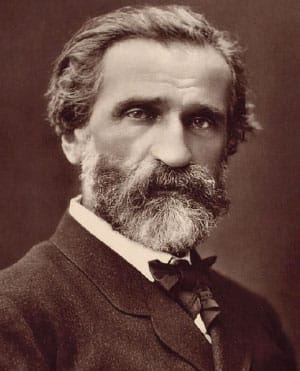
Giuseppe Verdi was often accused of agnosticism. His second wife, Giuseppina Strepponi, described the composer’s spiritual outlook as a matter of temperament: “He’s the soul of honesty, he understands and feels every noble and delicate sentiment; yet for all that, [he] allows himself to be, I won’t say an atheist, but certainly not much of a believer, and all with a calm obstinance that makes you want to thrash him.”
No wonder this Requiem appeals to the nonreligious. Verdi humanizes it, bringing the drama back to individuals with enormous needs: for grace, for redemption, for eternal peace, or at least an escape from torment. The soloists are relatable in the same way that opera heroes and heroines are relatable: larger than life but fatally flawed.
Requiem Roots
In 1868, soon after the death of Gioachino Rossini, Verdi envisioned a compilation Requiem in honor of the late composer, with the various parts supplied by 13 of Italy’s leading composers. Verdi himself composed the final Libera me. It was not performed in 1869, as originally scheduled for the first anniversary of Rossini’s death, and in fact the compilation Requiem wasn’t premiered in its complete form until 1988.
Verdi was further moved in 1873 by the death of the Italian novelist and poet Alessandro Manzoni, a hero of the Risorgimento (the 19th-century Italian unification movement). He decided to revise his earlier Libera me and complete the remaining Requiem movements himself.
The Music
In the opening movement, an appeal on behalf of the recently departed for a peaceful rest, the chorus sings from the perspective of the mourners. Prefaced by austere low strings, the singers begin with the standard lines “Requiem aeternam dona eis, Domine” (Grant them eternal rest, oh Lord), which the chorus and orchestra intone with a hushed gravitas. The four solo singers join the chorus and orchestra for a jubilant Kyrie eleison (Lord, have mercy).
The doomy and demonic second movement, the nine-part Dies irae (Day of Wrath), slashes and burns through a terrifying series of scenarios wherein the sinners individually confront their wretched souls. What awaits us after death? Eternal perdition, or a joy so perfect that the most celestial fugue can only approximate it? The Dies irae is based on a poem about Judgment Day commonly attributed to Thomas of Celano, a 13th-century Franciscan monk. In his setting of the medieval text, Verdi squires us through all the stages of grief. Against punishing bass drum and shrieking piccolo, and preceded by apocalyptic brass fanfares, the choristers describe the day that fire consumes the world.
The solo quartet sings the Offertorio, a light-rinsed, lullaby-like testament to the creator’s tender mercies. Here the four singers describe the holy radiance that God promises to bestow on Abraham and his descendants.
The Sanctus, a resplendent double fugue for two choruses, is sung from the angelic perspective: divinity casting a fond downward glance at the suffering humans. The angels’ joy seems almost explosive, in contrast to the anguish of the human characters. Against spare orchestral accompaniment, the chorus, soprano, and later mezzo-soprano sing the Agnus Dei: “Lamb of God, who takes away the sins of the world, grant them rest.”
Sometimes a cappella and sometimes accompanied by shimmering strings and delicate winds, the mezzo-soprano, tenor, and bass deliver the luminous Lux aeterna (Eternal light).
The soprano returns, with chorus, for the transcendent Libera me, which redirects our attention to the singular terrified sinner. On one level, you can appreciate the final movement as an aria, a gracefully emotive outpouring of bel canto splendor. At its climactic midpoint, the soprano’s high C rips through the chorus to remind us of her individual suffering. The chorus responds, a soothing balm made of light. A wild fugue develops, jagged with accidentals, propelled past terror into panic. Is the sinner consoled or even redeemed by this onslaught of beauty, or simply distracted from the potential terrors of the afterlife? Verdi respects us too much to speak for a God he wasn’t entirely sure even existed. He puts his faith in our collective capacity to figure it out for ourselves. The Requiem ends with the soprano and chorus crooning so softly that they might as well be whispering, “Libera me”: Deliver me. Into what, who can say?
—René Spencer Saller
A version of this note previously appeared in the program book of the Dallas Symphony.
Text and Translations
Mozart: Ave verum corpus, K.618
Ave verum corpus,
natum de Maria Virgine;
vere passum, immolatum
in cruce pro homine,
cujus latus perforatum,
unda fluxit sanguine:
esto nobis praegustatum
in mortis examine.
O dulcis, O pie,
Jesu Fili Mariae,
miserere mei.
Hail, true body,
born of the Virgin Mary,
who truly suffered the sacrifice
upon the cross for humankind,
whose side, having been pierced,
flowed with water and blood:
May you be for us a foretaste
in the trial of death.
O gentle, O merciful
Jesus, Son of Mary,
have mercy upon me.
Getty: Intermezzo from
Goodbye, Mr. Chips
Long remembered, old in story,
Lads before us come and gone.
Fare you well, lads, off to glory,
Banners high, our contest won:
We who stay will follow after,
One and all for worst and best,
Brace and beam and rail and rafter,
Each with each to stand the test,
Fellows all in tears and laughter,
Shipmates on our journey west.
—Gordon Getty
Getty: Saint Christopher
The birds and I
Are born to die
But we have the sky
And a place to sleep.
God keeps the shore,
God holds the sea,
In time before,
In time to be,
His hand is set upon the deep
And in His purpose He will keep.
—Gordon Getty
Getty: The Old Man in the Snow
(In Memoriam)
I saw him once again. It was the white
Of winter, all white everywhere, all new,
The world of old rechristened in a hush
Of snowfall. Once again it seemed that he
Had found a place remembered, kept aside,
A special place where she of long ago,
Forever lost, forever held, had passed,
And once again he mused aloud. He said:
“She is the child of beauty, and she sings
What beauty sings, what willow and the thrush
And river sing, of what comes first and last,
Of air and earth and fire and water, things
All of a piece, unmingled, sure and true,
Kept each by each the same, and even so,
Of what all weave together, of the thread
That ties Uranus to his mortal bride,
Of beauty wrought when air and fire decree
Shadows of cloud banks in the westward light,
When air and earth and fire and water cast
Rainfall and rainbow, dusk and eventide,
Moonrise, a rush of wind, a rush of wings,
A star, a rush of stars, the mother night.”
He paused. Again I could not leave unheard;
The snow had hardened. Best to wait him through,
Just as before. Now she of memory
Would live in mine as well, for best or worst,
A while at least, and in the thoughts of those
Who hear me. Somewhere now, far off, there rose
Voices, a dog barking, laughter. Then
He spoke once more, and in a softer key:
“She is the child of sorrow, and she knows
What sorrow knows, how one by one we first
Draw hither, one by one we choose, and reach
A hand to take a hand; we speak a word,
Then one by one must pass to whence we drew
And leave the rest in rue for what had been,
What we who knew and saw may stay to teach
To strangers in the speech and song of men.
O beauty broken, beauty taken, shorn,
Gone to the place where world and night began,
Whence beauty drew when first the world was born,
Where go the wind and snow and thrush and man
While we are left to sing and speak and mourn
And hold a name in honor while we can.”
—Gordon Getty
Requiem
Requiem aeternam dona eis, Domine,
et lux perpetua luceat eis.
Te decet hymnus, Deus, in Sion,
et tibi reddetur votum in Jerusalem.
Exaudi orationem meam.
Ad te omnis caro veniet.
Requiem aeternam dona eis, Domine,
et lux perpetua luceat eis.
Kyrie eleison.
Christe eleison.
Kyrie eleison.
Dies irae
Dies irae, dies illa
Solvet saeclum in favilla,
Teste David cum Sibylla.
Quantus tremor est futurus
Quando judex est venturus
Cuncta structe discussurus!
Tuba mirum spargens sonum,
Per sepulchra regionum,
Coget omnes ante thronum.
Mors stupebit et natura
Cum resurget creatura
Judicanti responsura.
Liber scriptus proferetur,
In quo totum continetur,
Unde mundus judicetur.
Judex ergo cum sedebit,
Quidquid latet apparebit,
Nil inultum remanebit.
Quid sum miser tunc dicturus?
Quem patronum rogaturus,
Cum vix justus sit securus?
Rex tremendae majestatis,
Qui salvandos salvas gratis,
Salva me, fons pietatis.
Recordare, Jesu pie,
Quod sum causa tuae viae,
Ne me perda illa die.
Quaerens me, sedisti lassus,
Redemisti crucem passus;
Tantus labor non sit cassus.
Juste Judex ultionis,
Donum fac remissionis
Ante diem rationis.
Ingemisco tamquam reus:
Culpa rubet vultus meus.
Supplicanti parce Deus.
Qui Mariam absolvisti
Et latronem exaudisti,
Mihi quoque spem dedisti.
Preces meae non sunt dignae,
Sed to bonus fac benigne,
Ne perenni cremer igne.
Inter oves locum praesta
Et ab haedis me sequestra,
Statuens in parte dextra.
Confutatis maledictis,
Flammis acribus addictis,
Voca me cum benedictis.
Oro supplex at acclinis,
Cor contritum quasi cinis,
Gere curam mei finis.
Lacrymosa dies illa
Qua resurget ex favilla
Judicandus homo reus.
Huic ergo parce, Deus,
Pie Jesu Domine:
Dona eis requiem. Amen.
Offertorio
Domine Jesu Christe, Rex gloriae,
libera animas omnium fidelium defunctorum
de poenis inferni et de profundo lacu:
libera eas de ore leonis,
ne absorbeat eas Tartarus, ne cadant in obscurum.
Sed signifer sanctus Michael
repraesentet eas in lucem sanctam,
Quam olim Abrahae promisisti
et semini eius.
Hostias et preces tibi, Domine, laudis offerimus.
Tu suscipe pro animabus illis
quarum hodie memoriam facimus.
Fac eas, Domine,
de morte transire ad vitam.
Quam olim Abrahae promisisti
et semini eius.
Libera animas omnium fidelium defunctorum
de poenis inferni.
Fac eas de morte transire ad vitam.
Sanctus
Sanctus, sanctus, sanctus, Domine Deus Sabaoth.
Pleni sunt coeli et terra gloria tua.
Hosanna in excelsis.
Benedictus qui venit in nomine Domini.
Hosanna in excelsis.
Agnus Dei
Agnus Dei, qui tollis peccata mundi:
dona eis requiem.
Lux aeterna
Lux aeterna luceat eis, Domine,
cum Sanctis tuis in aeternum,
quia pius es.
Requiem aeternam dona eis, Domine,
et lux perpetua luceat eis.
Libera me
Libera me, Domine, de morte aeterna,
in die illa tremenda quando coeli movendi sunt et terra;
dum veneris judicare saeculum per ignem.
Tremens factus sum ego et timeo,
dum discussio venerit atque ventura ira,
quando coeli movendi sunt et terra.
Dies irae, dies illa calamitatis et miseriae,
dies magna et amara valde.
Requiem aeternam dona eis, Domine,
et lux perpetua luceat eis,
Libera me, Domine, de morte aeterna,
in die illa tremenda,
quando coeli movendi sunt et terra;
dum veneris judicare saeculum per ignem.
Libera me.
Requiem
Grant them eternal rest, oh Lord,
and let everlasting light shine upon them.
To you, oh God, praise is due in Zion,
and homage will be done in Jerusalem.
Hear my prayer.
Unto you all flesh shall come.
Grant them eternal rest, oh Lord,
and let everlasting light shine upon them.
Lord, have mercy upon us.
Christ, have mercy upon us.
Lord, have mercy upon us.
Dies irae
The Day of Wrath, that day
shall dissolve the world in ashes,
as David and the Sibyl foretold.
What trembling shall there be
when the Judge shall come
who shall thresh out all completely!
The trumpet, scattering a wondrous sound
through the tombs of all lands,
shall drive all unto the throne.
Death and Nature shall be astounded
when creation rises again
to answer the Judge.
A written book shall be brought forth,
in which shall be contained all
for which the world shall be judged.
And therefore when the Judge shall sit,
what is hidden shall be manifest,
and nothing shall remain unavenged.
What shall I say in my misery?
Whom shall I ask to be my advocate,
when even the righteous are fearful?
King of awesome majesty,
who freely saves the redeemed,
save me, oh fount of mercy.
Recall, merciful Jesus,
that I am the cause of your journey,
do not lose me on that day.
Seeking me, you sat down weary;
you redeemed me, suffering on the cross;
let it not have been in vain.
Oh Just Judge of vengeance,
give the gift of remission
before the day of reckoning.
I groan as one guilty:
my face blushes at my sin.
Spare your supplicant, oh God.
You who absolved Mary
and heard the thief’s prayer
have given me hope also.
My prayers are not worthy,
but show mercy, good Lord,
lest I burn in everlasting fire.
Give me a place among your sheep
and put me apart from the goats,
setting me on the right hand.
When the damned are confounded
and consigned to sharp flames,
call me with the blessed.
I pray, kneeling in supplication,
a heart contrite as ashes,
take my ending into your care.
Lamentable is the day
on which the guilty shall arise
from the ashes to be judged.
Spare this one, oh God.
Merciful Lord Jesus:
Grant them rest. Amen.
Offertorio
Oh Lord, Jesus Christ, King of Glory,
deliver the souls of all the departed faithful
from the torments of hell and from the bottomless pit;
deliver them from the mouth of the lion,
lest Tartarus swallow them, lest they fall into the darkness.
But let Saint Michael the standard-bearer
bring them forth into the holy light,
which you once promised to Abraham
and his seed.
To you, oh Lord, we give our offerings and prayers with praises.
Receive them for those souls
whom we commemorate today.
Make them, oh Lord,
pass from death to life,
which you once promised
to Abraham and his seed.
Deliver the souls of all the departed faithful
from the torments of hell.
Make them pass from death to life.
Sanctus
Holy, holy, holy, Lord God of Sabaoth.
Heaven and earth are full of your glory.
Hosanna in the highest.
Blessed is he who comes in name of the Lord.
Hosanna in the highest.
Agnus Dei
Lamb of God, who takes away the sins of the world,
grant them rest.
Lux aeterna
Let everlasting light shine on them, oh Lord,
with your saints forever,
for you are merciful.
Grant them eternal rest, oh Lord,
and let everlasting light shine upon them.
Libera me
Deliver me, oh Lord, from eternal death
in that awful day when the heavens and the earth shall be moved;
when you will come to judge the world by fire.
I tremble, and I fear
the trial and the wrath to come,
when the heavens and the earth shall be moved.
A day of wrath, that day of calamity and woe,
a great day and bitter indeed.
Grant them eternal rest, oh Lord,
and let everlasting light shine upon them.
Deliver me, oh Lord, from eternal death
in that awful day
when the heavens and the earth shall be moved;
when you will come to judge the world by fire.
Deliver me.
About the Artists
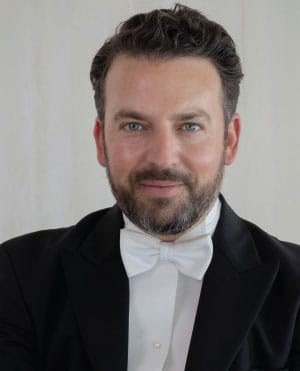
James Gaffigan
American conductor James Gaffigan is general music director of Komische Oper Berlin and music director of the Queen Sofía Palace of the Arts in Valencia, Spain. As an orchestral conductor, he regularly works with the New York Philharmonic, Cleveland Orchestra, Philadelphia Orchestra, National Symphony, Los Angeles Philharmonic, Detroit Symphony, and Metropolitan Opera. In Europe, he has appeared with the London Symphony, Royal Concertgebouw Orchestra, Vienna Symphony, Munich Philharmonic, Berlin Staatskapelle, Czech Philharmonic, Bavarian State Opera, and Vienna State Opera.
Gaffigan’s previous titles include principal guest conductor of both the Netherlands Radio Philharmonic Orchestra and the Trondheim Symphony Orchestra and Opera, chief conductor of the Lucerne Symphony, and assistant conductor of the Cleveland Orchestra. He made his San Francisco Symphony debut in December 2006, served as Associate Conductor from 2006–09, and will return for three programs next season. He was first prize winner of the 2004 Sir Georg Solti International Conducting Competition.
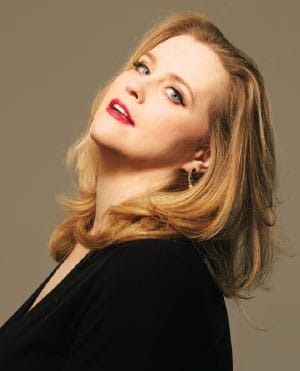
Rachel Willis-Sørensen
Rachel Willis-Sørensen began this season with a return to the role of Rosalinde in Die Fledermaus in concert with Les Musiciens du Louvre. She then returned to the Metropolitan Opera to perform Leonora in Il trovatore, which she also sang in March at the Royal Opera House, Covent Garden. She made her house debut at the Teatro di San Carlo as Elisabetta in Don Carlo, and made her debut at the Philharmonie de Paris in a concert version of La Traviata. In the spring, she made her role and house debut in the title role of Norma at the Berlin State Opera. She makes her San Francisco Symphony debut with these performances.
Previous engagements include San Francisco Opera (most recently as the title role in Rusalka), LA Opera, Houston Grand Opera, Santa Fe Opera, Lyric Opera of Chicago, Glyndebourne, Paris Opera, and Vienna State Opera, among others. She signed a multi-record deal with Sony Classical, which released her debut album in 2022 and Richard Strauss’s Four Last Songs in 2023. Willis-Sørensen won first prizes at the 2014 Operalia Competition and at the 2011 Hans Gabor Belvedere Singing Competition, and she was a winner of the 2010 Metropolitan Opera National Council Auditions.

Jamie Barton
Jamie Barton is increasingly recognized for how she uses her powerful instrument offstage—lifting up women, queer people, and other marginalized communities. Her lively social media presence serves as a hub for conversations about body positivity, social justice issues, and LGBTQ+ rights. In recognition of her performance at the Last Night of the Proms, Barton was named 2020 Personality of the Year at the BBC Music Magazine Awards. She is also the winner of the Beverly Sills Artist Award, Richard Tucker Award, both Main and Song Prizes at the BBC Cardiff Singer of the World Competition, and the Metropolitan Opera National Council Auditions. Her solo albums include All Who Wander, which received the 2018 BBC Music Magazine Vocal Award, and Unexpected Shadows, nominated for a 2022 Grammy Award for Best Classical Solo Vocal Album. She made her San Francisco Symphony debut in 2021’s Holiday Gaiety program.
This season, Barton made a dual role and company debut as Baba the Turk in The Rake’s Progress at Paris Opera and sang Azucena in the Metropolitan Opera’s Il trovatore. She also debuted as Nettie Fowler in Rodgers & Hammerstein’s Carousel with Boston Lyric Opera before appearing as Amneris in Baltimore Symphony Orchestra’s Aïda. She opened the Danish Radio Symphony season in Das Lied von der Erde and returned to the BBC Proms for Mahler’s Rückert-Lieder with BBC Symphony.

Mario Chang
Mario Chang has appeared at the Metropolitan Opera as Nemorino in L’elisir d’amore, the Italian Tenor in Der Rosenkavalier, Arturo in Lucia di Lammermoor, and the Fourth Squire in Parsifal. He has also performed at Los Angeles Opera as Rodolfo in La bohème and as Ismaele in Nabucco; at Santa Fe Opera as Edgardo in Lucia di Lammermoor; and with Washington National Opera, Atlanta Opera, and Opera Frankfurt as Alfredo in La Traviata. He made his Hollywood Bowl debut as Cassio in Otello with the Los Angeles Philharmonic, and has appeared at Carnegie Hall.
Chang was a member of the Lindemann Young Artist Devel-opment Program at the Met and holds an advanced diploma from the Juilliard School. His awards include first prize, zarzuela prize, and audience favorite at the 2014 Operalia Competition, as well as first prize, Plácido Domingo Prize, and Amigos de Sabadell Prize in the Francisco Viñas Competition. A native of Guatemala, he is the founder and director of Querido Arte Ópera de Guatemala, the first opera company in the country, and was appointed an ambassador of peace and culture by the Guatemalan government. He made his San Francisco Symphony debut in July 2016.
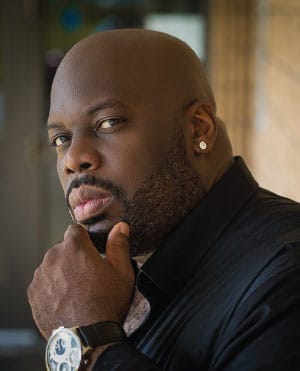
Morris Robinson
This season, Morris Robinson returned to the Metropolitan Opera for a new production of Aïda, Houston Grand Opera for Il trovatore, and Atlanta Opera in Macbeth, and appears in concert with the National Symphony and Boston Symphony. He has performed with many of the world’s leading opera companies including the Metropolitan Opera, San Francisco Opera, Lyric Opera of Chicago, Dallas Opera, Houston Grand Opera, Los Angeles Opera, Cincinnati Opera, La Scala, and the Aix-en-Provence Festival. Also a prolific concert singer, Robinson has appeared with the New York Philharmonic, Chicago Symphony, Los Angeles Philharmonic, National Symphony, São Paulo Symphony, and NDR Elbphilharmonie. In recital he has been presented by Spivey Hall in Atlanta, the Savannah Music Festival, the Philadelphia Chamber Music Society, the Metropolitan Museum of Art, and Carnegie Hall as part of Jessye Norman’s HONOR! Festival. He made his San Francisco Symphony debut in 2017’s Handel’s Messiah.
Robinson’s first album, Going Home, was released by Decca. He is also a featured artist on the LA Phil’s recording of Mahler’s Symphony No. 8, which won the 2022 Grammy Award for Best Choral Performance. An Atlanta native, he is a graduate of the Citadel and an alumnus of the Metropolitan Lindemann Young Artists Program.

Jenny Wong
Jenny Wong is Chorus Director of the San Francisco Symphony, as well as the associate artistic director of the Los Angeles Master Chorale. Recent conducting engagements include the Los Angeles Philharmonic Green Umbrella Series, Los Angeles Opera Orchestra, the Industry, Long Beach Opera, Pasadena Symphony and Pops, Phoenix Chorale, and Gay Men’s Chorus of Los Angeles.
She has prepared choruses for the Los Angeles Philharmonic, including for a recording of Mahler’s Symphony No. 8 that won a 2022 Grammy Award for Best Choral Performance. She has also prepared choruses for the Chicago Symphony, Los Angeles Chamber Orchestra, and Music Academy of the West.
A native of Hong Kong, Wong received her doctor of musical arts and master of music degrees from the University of Southern California and her undergraduate degree in voice performance from the University of Illinois, Urbana-Champaign. She won two consecutive world champion titles at the World Choir Games 2010 and the International Johannes Brahms Choral Competition 2011.
About the SF Symphony Chorus
The San Francisco Symphony Chorus was established in 1973 at the request of Seiji Ozawa, then the Symphony’s Music Director. The Chorus, numbering 32 professional and more than 120 volunteer members, now performs more than 26 concerts each season. Louis Magor served as the Chorus’s director during its first decade. In 1982 Margaret Hillis assumed the ensemble’s leadership, and the following year Vance George was named Chorus Director, serving through 2005–06. Ragnar Bohlin concluded his tenure as Chorus Director in 2021, a post he had held since 2007. Jenny Wong was named Chorus Director in September 2023.
The Chorus can be heard on many acclaimed San Francisco Symphony recordings and has received Grammy Awards for Best Performance of a Choral Work (for Orff’s Carmina burana, Brahms’s German Requiem, and Mahler’s Symphony No. 8), Best Classical Album (for a Stravinsky collection and for Mahler’s Symphony No. 3 and Symphony No. 8), and most recently Best Opera Recording (for Saariaho’s Adriana Mater).
Lead support for the San Francisco Symphony Chorus this season is provided through a visionary gift from an anonymous donor.
To learn more about their generous gift, a new Chorus endowment, and ways to support it, please contact Jay Auslander, Director of Legacy Giving, at 415.503.5404 or jauslander@sfsymphony.org.
San Francisco Symphony Chorus
SOPRANOS
Elaine Abigail
Naheed Attari
Sylvia V. Baba
Kayla Bojkovsky*
Arlene Boyd
Olivia T. Brown
Laura Canavan
Phoebe Chee*#
Mun-Wai Chung
Francielle De Barros
Andrea Drummond
Tonia D’Amelio*
Cara Gabrielson*
Susanna Gilbert
Julia Hall
Betsy Johnsmiller
Anna Keyta*
Elizabeth Kimble*
Jennifer Mitchell*
Diana Pray*
Laura Stanfield Prichard
Shroothi P. Ramesh
Kelly Ryer
Natalia Salemmo*#
Rebecca Shipan
Sarah Vig
Lauren Wilbanks
ALTOS
Carolyn Alexander
Christina E. F. Barbaro
Melissa Butcher
Celeste Camarena
Enrica Casucci
Carol Copperud
Sara Couden*
Dr. Nicole Daamen
Corty Fengler
Sonia Gariaeff*
Amy L. Hespenheide
Emily (Yixuan) Huang
Gretchen Klein
Donna Kulkarni
Margaret (Peg) Lisi*
Brielle Marina Neilson*
Kimberly J. Orbik
Linda J. Randall
Meredith Riekse
Celeste Riepe
Jeanne Schoch
Sandy Sellin
Dr. Meghan Spyker*
Kyle S. Tingzon*#
Makiko Ueda
Merilyn Telle Vaughn*
Heidi L. Waterman*
Hannah J. Wolf
TENORS
Paul Angelo
Alexander P. Bonner
Todd Bradley
Scott Dickerman
Thomas L. Ellison
Elliott JG Encarnación*#
Sam Faustine*
Ron Gallman
Kevin Gibbs*
Edward Im
Alec Jeong
James Lee
Benjamin S. Lorenzoni
John Mansfield*
Ryan S. Peterson
David Kurtenbach Rivera*
Darita Seth*
Tetsuya Taura
Troy Turriate*
Jack Wilkins*
Weichen Winston Yin
John Paul Young
BASSES
Sean Brooks
Phil Buonadonna
Robert Calvert
Sean Casey
Adam Cole*
Noam Cook
James Radcliffe Cowing III
Rick Galbreath
Rob Lloyd Huber
Joshua Hughes*
Roderick Lowe
Tim Marson
Richard Mix*
James Monios*
Clayton Moser*
Chengrui Pan
Jess Green Perry
Matthew C. Peterson*
Michael Prichard
Mark E. Rubin
Storm K. Staley
Connor Tench
David Varnum*
Goangshiuan Shawn Ying
Jenny Wong,
Chorus Director
John Wilson,
Rehearsal Accompanist
*Member of the American
Guild of Musical Artists
#Soloist (Getty Pieces)

